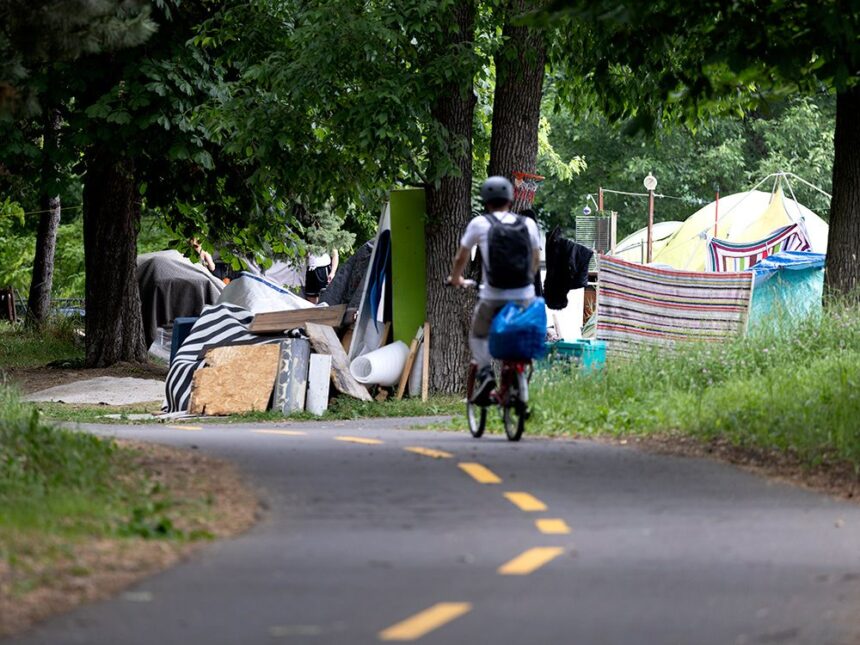Montreal’s recent sweeps of homeless encampments have continued despite a damning report showing these clearings fail to address the root causes of homelessness while violating residents’ rights, advocates say.
Last week, city workers dismantled a small settlement of tents near the Berri-UQAM metro station, the fifth such operation this year. The clearing came just days after researchers from McGill University published findings that these removals often scatter vulnerable populations without providing adequate alternatives.
“They take everything you own, and then what? Where are we supposed to go?” asked Marcel Lapierre, 54, who lost his apartment last winter after a rent increase he couldn’t afford. Lapierre had been living in the encampment for three months before authorities arrived with little warning.
The McGill report, authored by Dr. Hannah Richardson and a team from the School of Urban Planning, documented 37 encampment clearings across Montreal since 2020. Their research found fewer than 40 percent of displaced residents successfully transitioned to stable housing, with many simply relocating to less visible areas of the city.
According to the most recent point-in-time count, Montreal’s homeless population has increased by approximately 35 percent since 2018, with affordable housing vacancy rates hovering below 1 percent. The COVID-19 pandemic exacerbated these trends, pushing more people onto the streets as shelters reduced capacity to maintain social distancing.
Mayor Valérie Plante’s administration has defended the clearings as necessary for public health and safety. “These operations are always conducted with compassion and respect,” said city spokesperson Catherine Cadotte in an emailed statement. “Outreach workers accompany our teams to offer alternative accommodations and support services.”
But frontline workers paint a different picture. Martin Pagé, who coordinates street outreach for Le Refuge, said the city’s approach creates more harm than good.
“These people build communities for safety and survival,” Pagé explained while distributing coffee near Place Émilie-Gamelin. “When we dismantle these spaces without real housing options, we’re breaking trust and making it harder to connect people with services they need.”
The Quebec Human Rights Commission has expressed concern about the practice. Commissioner Philippe-André Tessier noted that encampment clearings potentially violate several protected rights, including security of person and dignity.
For residents like Jeanne Morin, who has cycled through three encampments this year, the constant displacement has profound effects. “Each time I move, I lose something—medicine, ID documents, photos of my kids,” she said. “How can I apply for housing programs when I keep losing my paperwork?”
Provincial housing minister France-Élaine Duranceau announced $12 million in emergency funding for homeless services last month, but advocates say this falls far short of what’s needed. Sam Watts, CEO of Welcome Hall Mission, estimates Montreal needs at least 3,000 additional supportive housing units to meaningfully address the crisis.
“We’re applying band-aids when the patient needs surgery,” Watts said. “Until we treat housing as a right rather than a commodity, we’ll keep seeing people in tents.”
The McGill report recommends several alternatives to encampment clearings, including designated camping areas with sanitation facilities, expanded rent supplement programs, and converting vacant buildings into transitional housing.
Some cities have taken different approaches. Victoria, B.C. established sanctioned encampments during the pandemic, while Toronto instituted a moratorium on most clearings during winter months. Montreal has yet to adopt similar measures despite calls from community organizations.
City councillor Craig Sauvé, who represents the Southwest borough, has pushed for a more compassionate strategy. “We can’t police our way out of a housing crisis,” he said during a recent council meeting. “Every clearing costs taxpayers money and pushes vulnerable people further into the margins.”
The issue has sparked debate among Montreal residents. A recent Léger poll found Montrealers divided, with 48 percent supporting the city’s approach to encampments and 43 percent opposing current methods. Support for clearings was highest among homeowners and lowest among renters and those under 35.
As winter approaches, concerns grow for those left without options. Montreal’s shelter system typically operates at capacity during cold months, and last winter saw emergency warming centers turn people away on particularly frigid nights.
For Marcel Lapierre, the future remains uncertain. After the clearing, he found temporary space at a shelter but will need to leave in two weeks when his allotted time expires.
“Politicians talk about solutions, but I don’t see them,” he said, repacking his belongings into a weathered backpack. “Meanwhile, I’m just trying to survive another day.”






